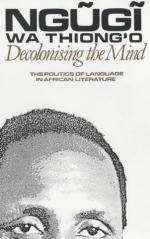
|
| Name: _________________________ | Period: ___________________ |
This quiz consists of 5 multiple choice and 5 short answer questions through Chapter 3 (Parts I-III): "The Language of African Fiction" .
Multiple Choice Questions
1. When did Ngũgĩ wa Thiong’o begin writing in Gĩkũyũ?
(a) 1977.
(b) 1982.
(c) 1975.
(d) 1973.
2. Where did David Diop get his primary education?
(a) Mauritania.
(b) Senegal.
(c) The Ivory Coast.
(d) Guinea.
3. Who invented mathematical science?
(a) The Kikuyu.
(b) The Europeans.
(c) The Arabs.
(d) The Chinese.
4. When was This Time Tomorrow written?
(a) 1972.
(b) 1966.
(c) 1959.
(d) 1945.
5. When was The Black Hermit first produced?
(a) 1959.
(b) 1969.
(c) 1944.
(d) 1962.
Short Answer Questions
1. In Chapter 1, Part IV the author states that language as communication has three aspects. The first of these is the language of real life, which he attributes to having been coined by whom?
2. The chorus in Ngaahika Ndeenda asks where the grave is for whom?
3. What did a very cruel prison superintendent warn Ngũgĩ wa Thiong’o against writing?
4. By what number was Ngũgĩ wa Thiong’o called in prison?
5. What does the Gĩkũyũ word "ngurukuhĩ" translate to in English?
|
This section contains 160 words (approx. 1 page at 300 words per page) |

|




